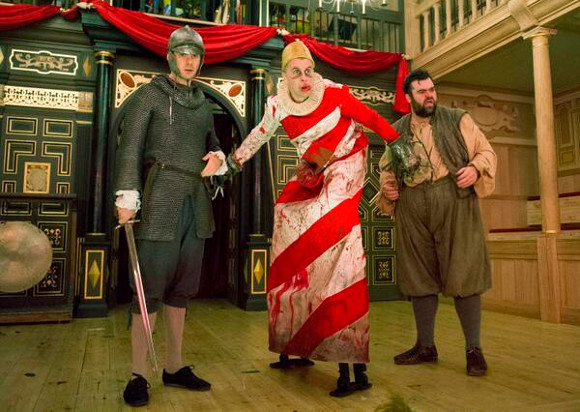The Knight of the Burning Pestle (Sam Wanamaker Playhouse)
Adele Thomas’ production of Francis Beaumont’s play opened at the Sam Wanamaker Playhouse last night (26 February 2014)

Nothing new under the sun in the theatre: Francis Beaumont‘s meta-theatrical romp – a satire of Italian romance, city comedy, knightly adventures, Elizabethan humours and audience participation – was written and performed over four hundred years ago.
Yet it clearly contains seeds of pantomime and Pirandello, the Goons and Monty Python: a grocer and his wife (Phil Daniels and Pauline McLynn) interrupt a play called The London Merchant and insist on their son, Rafe (Matthew Needham), setting off across continents like Don Quixote – a grocer errant in a blue apron with a steel helmet – accompanied by a stupid squire and a bearded dwarf (who’s enormous).
Their exploits, which include snaring a lion, braving the ogre Barbarossa – more ludicrous than a Knight of Ni – in his cave, and boarding the Princess Pompiona of Moldavia, are accomplished with the talisman of the "burning pestle" as a phallic symbol in a small box. And they cut across the chivalric contest between Jasper Merrythought (Alex Waldmann), a merchant’s apprentice, and a pink-hosed city slicker, "an arrant noddy" Humphrey (Dickon Tyrrell), for the hand (and body) of the well-bred Luce (Sarah MacRae).
The first performance of the play was in the small Blackfriars Theatre, so Adele Thomas‘s revival in the candlelit intimacy of the lovely new Sam Wanamaker is both an exploration of those conditions and a real test of a new venue; the rough-house nature of the play is successfully transmitted, although it does suffer from a strangely muted performance in the title role. Matthew Needham‘s Rafe is elegant in too blank a fashion, although hampered by a brace on one leg caused by a fall from the stage and torn ligaments.
If Needham’s reserve is deliberate, he wrongly supposes that a role once rumbustiously taken by Timothy Spall for the RSC (and once occupied, incredibly, by Noël Coward) is not caught up and buffeted by absurd events. Rafe is the chaotic result, indeed offspring, of an audience demanding their own play – with grocers in it – and the show doesn’t quite achieve the madcap blend of imposed fantasy and comedy spoof that leads to delirium.
Still, Daniels and McLynn are spot-on, very funny, as the heckling customers, rustling sweet papers, chai-aiking the rest of us, leaping up on the stage, ridiculing the actors; Waldmann and MacRae suitably straight-faced as lovers leaping the class barrier, and a shared coffin; and Tyrrell’s silly Humphrey nicely contrasted with Giles Cooper‘s frizzy-haired booby, Jasper’s knock-kneed mummy’s boy of a brother. And once Paul Rider‘s jovial Merrythought gets started on a song, there’s no stopping him, unfortunately.
This is an important play for all sorts of reasons, not least the variety and vigour of Beaumont’s poetry and prose, and its compendium of vulgarity and theatrical daring. It’s also got ghosts, non-stop silliness and rudeness, a gang of bearded woodland sprites in grey onesies, and a popular uprising in Mile End. What more do you want, exactly?












